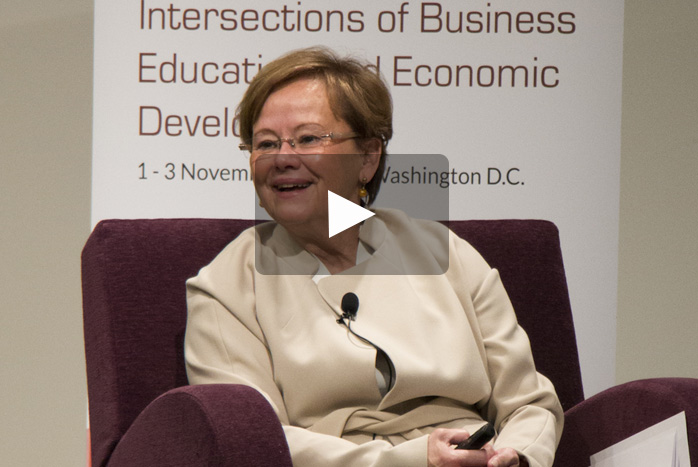Putting Academics to Work

Margee Ensign
President Ensign Discusses Intersection of Education and Economic Development at D.C. Conference
Video by Joe O'Neill
Dickinson President Margee Ensign was one of the keynote speakers at a recent conference in Washington, D.C., that brought together worldwide leaders from business, education and government to discuss how higher education business programs can play an important role in economic and community development.
The conference, “Intersections of Business Education and Economic Development,” was organized by the Global Business School Network, a nonprofit organization dedicated to strengthening management, entrepreneurial and leadership talent for the developing world through better access to quality, locally relevant education. More than 150 people attended the three-day event, including representatives of colleges and universities from 33 countries. Also attending were executives from Johnson & Johnson, Goldman Sachs and Chevron, as well as private entrepreneurial enterprises and nongovernment and transnational organizations such as the World Bank.
The theme of Ensign's remarks was that solutions to the developing world’s most vexing problems are within reach and that higher education, including business programs, have an important role to play. She cited her recent experience in Africa as president of the American University in Nigeria (AUN), which made a point of working with nearby communities to identify needs and develop programs to meet them.
AUN led an effort to feed hundreds of thousands of internally displaced persons for nearly three years during the height of the Boko Haram terrorist insurgency in northern Nigeria where the University is located. AUN's pragmatic, needs-based activism was a revelation for some of the African members of the audience, who asked Ensign how tradition-bound state institutions could transform themselves into useful problem solvers. She acknowledged the challenge but pointed to many successes on the continent, noting that Africa’s booming population requires new ways of doing things and a sense of urgency. Among the immediate needs is providing education to millions of out-of-school children who, with no future job prospects, could fall prey to terrorist recruiters.
AUN faculty and students pioneered the use of technology, including applications written in local languages loaded on tablet computers as well as radio. AUN also developed hundreds of sports teams with Muslims and Christians on the same team. She said no one involved on these teams joined a terrorist group. Her examples from Africa are applicable to all settings, including Dickinson, which must adapt to constant change and innovate to meet the needs of local communities and equip students to serve their countries and the world.
At Dickinson, Ensign has already gathered community leaders to learn about new ways Dickinson can help Carlisle. Ensign acknowledged that faculty and students are already heavily involved in helping the community, and she has launched a presidential commission to keep those efforts focused and effective.
The schools of business represented at the conference reflected every major area of the world. They are in the early stages of applying theory to practice by fostering entrepreneurship, mentoring businesses, improving jobs-skill training and developing and disseminating best practices.
TAKE THE NEXT STEPS
Published December 5, 2017